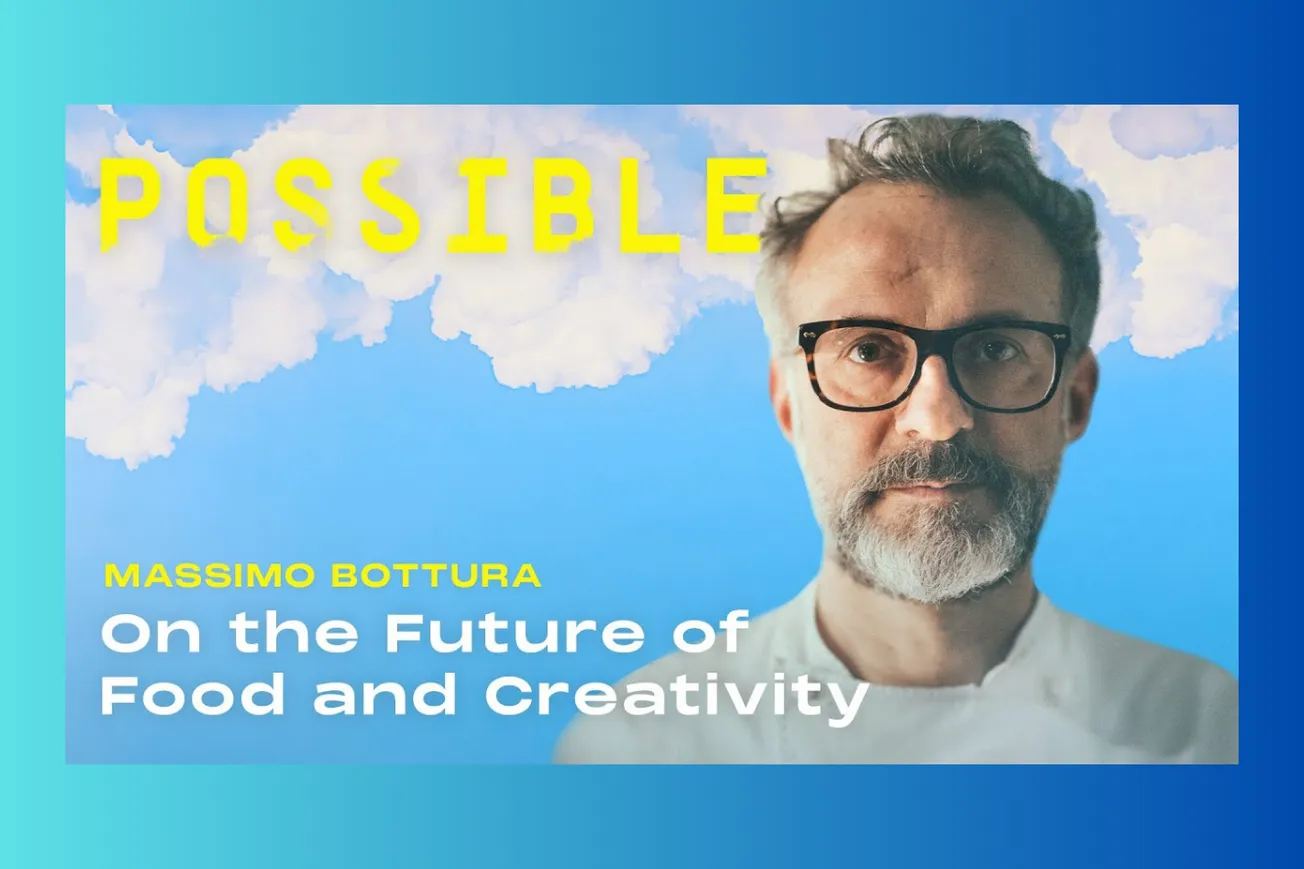Table of Contents
World-renowned chef Massimo Bottura reveals how technology can amplify rather than replace human creativity, sharing insights on AI's role in fine dining and his revolutionary Food for Soul movement.
Key Takeaways
- Technology should eliminate human errors in cooking basics, freeing chefs to focus on creativity and emotional storytelling through food
- The "oops I dropped the lemon tart" philosophy transforms imperfection into innovation, something AI cannot replicate
- Restaurant service accounts for 50% of the dining experience success, requiring human psychology and emotional intelligence
- Food for Soul has rescued over 10,000 tons of surplus food, creating millions of meals across 13 global locations
- Future restaurants will blend AI precision with human creativity, maintaining the irreplaceable element of emotional connection
- Successful culinary teams require both technical perfection and irrational creative management that only humans can provide
- Culture and continuous learning represent the most important ingredients for shaping the culinary industry's future
The Renaissance Mind in Modern Kitchens
Massimo Bottura describes himself as a "renaissance man" running restaurants that function as cultural ateliers where knowledge, consciousness, and responsibility develop alongside exceptional cuisine. His approach demonstrates how traditional culinary arts can embrace technological advancement without sacrificing their essential humanity.
- His philosophy centers on "evolving tradition" by examining the past critically rather than nostalgically, extracting the best elements for future innovation
- The crunchy part of lasagna matters more than eating a full slice because diners consume emotions, not just food portions
- Contemporary thinking prevents culinary traditions from becoming dusty relics, ensuring they remain vibrant and relevant
- Technology serves as a tool for precision while human creativity handles the irrational and unexpected elements of cooking
AI applications in professional kitchens already demonstrate significant potential for consistency and quality control. Italian pizza company Ital Pizza uses machines to achieve perfect dough temperature, precise tomato ratios, and optimal mozzarella portions.
- Machines eliminate daily human errors in basic preparation tasks, ensuring consistent product quality across different locations
- Chefs can redirect their energy toward recipe development and creative problem-solving instead of correcting routine mistakes
- Perfect replication becomes possible when cold, calculating approaches handle technical requirements
- Human intuition remains essential for managing unexpected situations and creative breakthroughs
Emotional Intelligence in Fine Dining
Service quality represents 50% of any restaurant evening's success, requiring staff members who understand psychology, timing, and individual customer needs. This human element cannot be automated or replicated through artificial intelligence.
- Restaurant teams must participate in creative processes to understand every dish's story and preparation methods
- Service staff function as communicators who translate kitchen artistry into meaningful guest experiences
- Perfect timing and respectful interaction create the foundation for memorable dining experiences
- Individual customer psychology requires human observation and adaptation that machines cannot provide
The transformation from good meals to unforgettable experiences depends entirely on emotional transfer through food presentation and service interaction.
- Good meals become forgettable within days, while emotional connections through food create lasting memories
- Teams working together as unified entities deliver experiences that individual excellence cannot achieve
- Restaurant etymology stems from "restore," meaning establishments should restore guests' souls through hospitality
- Travelers invest significant effort reaching destinations, deserving soul-restoration rather than mere sustenance
Creative Imperfection and Innovation
The famous "oops I dropped the lemon tart" dish exemplifies how human mistakes can become signature innovations that AI systems could never conceptualize or execute.
- Pastry chef Kondo Takahiko accidentally dropped a perfectly crafted lemon tart during plating at Osteria Francescana
- Bottura recognized beauty in chaos, instructing careful collection of fallen pieces with artistic flourishes
- The resulting dish celebrates imperfection and unexpected creativity, becoming a restaurant signature
- Three Michelin star establishments require intellectual exercises and poetic approaches that transcend mere technical precision
Creative thinking demands looking right when everyone else looks left, finding opportunities in apparent disasters.
- Everyday obligations can eliminate poetry from cooking if chefs focus solely on perfection and consistency
- Doubt drives innovation more effectively than confidence, pushing chefs to explore unfamiliar territory
- Mental palettes allow experienced chefs to imagine flavor combinations before physical preparation
- Intellectual exercises separate great restaurants from technically competent but uninspiring establishments
Global Food Waste Revolution
Food for Soul represents Bottura's most significant life project, addressing the paradox of global hunger alongside massive food waste through beauty, hospitality, and community engagement.
- Earth's population of 7.5 billion people coexists with food production capacity for 12 billion individuals
- 860 million people lack adequate nutrition while 33% of produced food gets wasted globally
- Wasted food represents squandered water, electricity, and human capital resources before contributing to climate change
- Refettorio locations transform surplus food into dignified meals for society's most vulnerable populations
The project began during Milan's 2015 Universal Exposition, creating a beautiful dining space in an abandoned theater rather than participating in the main exhibition.
- Pope Francis supported establishing the refettorio in Milan's most neglected neighborhood, Quartiere Greco
- Artists, designers, architects, and chefs collaborated to transform the dusty, rusty theater into a stunning community space
- Daily operations involved transforming 150 kilos of surplus ingredients into meals for children and adults in need
- International delegations witnessed the project's success, inspiring France and Italy to pass anti-food waste legislation
Current operations span 13 locations worldwide, from Sydney to Geneva, Naples to San Francisco, rescuing over 10,000 tons of surplus food annually.
- More than 110,000 volunteers participate globally, supported by chefs from every continent
- Each location adapts to local conditions while maintaining core principles of beauty, dignity, and community
- Cultural programming accompanies meals, fighting social isolation alongside food waste
- Continuous evolution ensures each refettorio remains relevant to its specific community needs
Technology Integration Without Soul Loss
Future restaurant operations will likely feature extensive automation for technical tasks while preserving human creativity for innovation and emotional connection.
- Robots excel at precision tasks like fish preparation, boneless cooking, and consistent temperature control
- Human chefs must manage irrational elements, creative breakthroughs, and unexpected situations
- Successful integration requires understanding which tasks benefit from mechanical precision versus human intuition
- Antonio's pasta and tomato dish in Tokyo demonstrates how human creativity transforms simple ingredients into dessert-level sophistication
The Japanese kitchen example illustrates ideal human-machine collaboration in high-end cuisine.
- Twenty Japanese chefs work with mechanical precision, never making technical mistakes
- One Neapolitan chef manages the irrational creative elements that robots cannot comprehend
- Perfect tomato selection involves seven varieties with different acidity, sweetness, and ripeness levels
- Creative recontextualization transformed a simple pasta course into an award-winning dessert concept
Common Questions
Q: How does AI enhance rather than replace human creativity in cooking?
A: AI handles technical precision and eliminates routine errors, freeing chefs to focus on innovation, emotion, and unexpected creative breakthroughs.
Q: What makes the "oops I dropped the lemon tart" dish significant?
A: It demonstrates how human imperfection and creative problem-solving can produce signature innovations that automated systems could never conceptualize.
Q: How does Food for Soul address global food waste?
A: The project transforms surplus food into dignified meals across 13 global locations, rescuing over 10,000 tons annually while fighting social isolation.
Q: Why does restaurant service matter as much as food quality?
A: Service provides 50% of the dining experience through psychological understanding, perfect timing, and emotional connection that creates lasting memories.
Q: What role will robots play in future restaurants?
A: Robots will handle precision tasks and eliminate human errors while chefs focus on creativity, emotion, and managing irrational elements of cuisine.
Technology will enhance human creativity in restaurants rather than replace it, allowing chefs to focus on emotional storytelling while machines handle technical precision. The future of dining lies in combining AI efficiency with irreplaceable human imagination and soul-restoration through hospitality.





